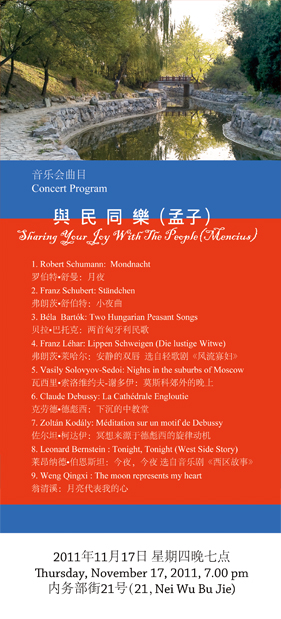Purpose of the Concert: Boost artistic, musical and creative skills of students of impoverished region in China especially in the Hebei Province. Also all the benefits of the exhibition will go to the social exposure programs of CIBE such as support for students in the Hebei Province, a primary and a Middle School, as well as an Autism foundation
1) Robert Schumann takes the beautiful poem of Joseph Eichendorff, “Mondnacht”, which describes a moon night (1840). Everything is quiet, perfectly at ease. Finally the poet feels so truly happy as if his soul is flying home.
2) Franz Schubert’s “Ständchen” is a song of his latest swan song. A last message, a prayer for love.
3) Bela Bartok collected Hungarian popular melodies together with his friend Zoltan Kodaly between 1910 and 1918. The two Hungarian Peasant Songs are based on authentic Hungarian melodies. Bartok confessed that his happiest time in his entire life has been spent among famers while he recorded their songs. Both Bartok and Kodaly made lasting contributions to integrate music into education for all students in Hungary.
4) Franz Lehar, “Die Lustige Witwe”, the “Merry Widow”, going back to 1905 in Vienna describes a self assured, shall we say emancipated woman who is successful in midst of a world of men. Let me call all the self assured and self assertive woman in our audience who should feel welcome to choose a partner for a Viennese Walzer, 1-2-3
5) Vasily Solovyov-Sedoi’s “Nights in the suburbs of Moscow” puts us also perfectly at ease when we watch Moscow. Originally we were supposed to watch the discrete beauty of Leningrad. But authorities changed that in 1955 to Moscow “where not even a whisper is to be heard” and which reminds us “Do not forget these summer nights”
6) The Sunken Cathedrale, “La Cathédrale Engloutie”, by Claude Debussy refers to a Breton myth which got under the water “due to the unethical behavior of its people”. As soon as people rediscover ethics it starts emerging from the water, bells start ringing, monks start chanting but also Eastern pentatonic scales are heard
7) Zoltan Kodaly, the great music educator and composer meditates over a motif of Debussy (1907). Even those composers who were the most innovative keep being inspired by listening and meditating over the masters.
8) Leonard Bernstein created the West Side Story with the lyrics from Stephen Sondheim (1961). The play features social problems and conflicts between different street gangs, on the one side the Jewish, on the other the Catholic gang. The love between Maria and Tony finally overcomes bloody conflicts and conveys a message of pardon and forgiveness.
9) Weng Qingxi describes the perhaps only convincing answer to the anxious question: how deep is your love? The fullness of moon.
10) And finally we honor the probably spiritually most vibrant people, Tibet. “Ah Lhasa” is not, as some think, a reference to the Province Capital of Lhasa but a deep sigh.

Stephan Rothlin
CIBE, November 14, 2011


|
